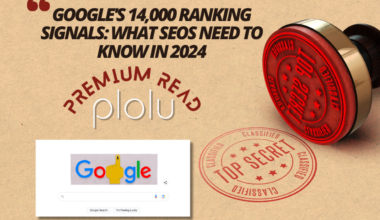Search engine optimisation is more than just a marketing strategy. It is a long-term investment that can result in increased website traffic and higher conversion rates. Organic search engine optimisation is the process of improving the visibility of your website on search engines like Google, Yahoo, and Bing. When you optimize your site for these search engines, you are increasing the chances that people will find it when they are searching for something related to your site’s content or products. One way to increase organic traffic sources is by using AI SEO tools. These tools use machine learning to automatically update your SEO strategy so that you can focus on other aspects of running your business.
What are AI SEO tools?
AI SEO tools are a computer system that uses machine learning to automatically optimize your website for search engine rankings. Most commonly, this is done through analyzing a website’s content and using that data to create an algorithm that ranks the site in various search engines. The AI system then updates this ranking at regular intervals, so it’s essential to keep your website up to date with fresh new content. The ability to use AI SEO tools has become a popular trend in recent years. It’s not uncommon for businesses to use these tools to help grow their search engine presence organically without having to do the work themselves. But, before you dive into blindly using one of these tools, it’s important for you to understand how each works in order for you to be able make the best decision possible. There are many things that you should consider when deciding if AI SEO tool is right for you. First, ask yourself if the tool is affordable and affordable for your business model and budget. What are the tools limitations? How long will it take to implement this tool into your website? And how much does it cost per month? These questions should help you decide which tool is best for you and your company’s needs.
How to do Organic SEO including Keyword Research
The Complete Guide to Organic SEO including Keyword Research with Case Studies is a guide that will help you learn how to perform keyword research in order to optimize your website for organic search.
This guide provides a step-by-step walkthrough of the process, from start to finish. The first section covers keyword research, and the second section covers on-page optimizations such as title tags, meta descriptions, page titles, and more.
A. Keyword Research
Keyword research is the backbone of any SEO campaign. It is the process of researching and finding the most relevant keywords that can be used to rank a website in search engines. There are many tools on the internet that can be used for keyword research. Some are free while others require a paid subscription or an annual fee. The best way to do keyword research is by using a mix of both free and paid tools so as to get better results with less effort.
-
SEOmoz is a free keyword research tool. It uses data from Google AdWords, Google Trends, Bing Ads and Yahoo! Search Marketing to create a list of keywords with the highest search volume over the past 12 months. The tool also uses historical trend data to identify keywords that have increased in popularity or decreased in popularity over time. To access the tool’s rankings, simply enter your market and then select “Top Keywords” under “Keywords & Market Research.”
-
Google AdWords Keyword Planner: Google Adwords Keyword Planner is one of the best options for keyword research. This tool helps advertisers find keywords by showing which words and phrases people are searching for, or that have high commercial intent. It can help you perform keyword research for different regions of the world and show keywords that are related to your business. https://adwords.google.com/o/KeywordPlanner
B. On page Optimisation
The on-page optimization process is not just about the content of your website, but also about how you present it. You should be aware of the importance of your title tags, meta descriptions and page titles.
Title tags are what Google and other search engines use to determine what your site is about, so they should be descriptive and relevant to your content. Your meta description is the snippet that appears in search engine results pages (SERPs) when people search for keywords related to your site. It should be short and concise, but also compelling enough to make people want to click through to read more. Page titles are what show up in the tab when someone has clicked on a link from a SERP or from another site. They too should be descriptive and relevant to the content on that page.
How to do Link Building in 2023
Link building is the act of acquiring links from other websites to your own. It is a crucial part of SEO, and one that you should be doing if you want to rank well in the SERPs. –
-
The first step in link building is identifying your audience. Who are they? What do they care about? What are their interests? This will help you figure out what sites to target for backlinks.
-
The second step is identifying the keywords that you want to rank for in the SERPs. This will help you figure out which websites might be interested in linking back to yours.
-
The third step is creating content that people will find useful and sharing it on social media platforms like Facebook, Twitter, Instagram, etc., so that it gets linked back to your site or blog post via a share button or embedded link on your page.
-
Finally, once someone has linked back to your site or blog post by using any of these methods, make sure to thank them in the comments section of the post, and comment on their website or blog with a link back to your site.
10 Powerful Strategies for Increasing Website Traffic without PPC Advertising
Website traffic is one of the most important factors for any company that is looking to grow. The more visitors a website gets, the higher its ranking will be on search engines and the more conversions it will receive.
An advertising campaign is an effective way of driving traffic to a site, but it can be expensive and time-consuming. If you don’t want to spend money on PPC ads, here are 10 strategies that may work for you:
-
Focus on Quality Content:
-
Optimize your meta tags
-
Create compelling headlines
-
Include keywords in your content
-
Use social media channels to promote your content
-
Participate in online communities and discussions related to your niche
-
Build links with other sites in your niche or industry (with permission)
-
Get involved with social media groups or communities related to your niche or industry (with permission)
-
Monitor competitor content and respond to it
-
Share success stories with other people in your niche (with permission):

